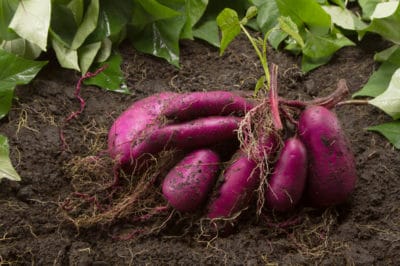How Climate Affects Yield
Climate may be the biggest factor when it comes to how much sweet potatoes will yield. Even short-season sweet potatoes need a frost-free growing season of well over 100 days. USDA Zones 8 through 11 meet the requirements best. In colder climates, gardeners must use season-extending techniques. Even then, you may need to harvest early because frost threatens, which means fewer and/or smaller tubers.
Growing Conditions and Yield
Although they can tolerate poor soil, sweet potatoes will do much better if grown in good conditions. At a minimum they need:
- Full sun, preferably eight to 10 hours a day.
- Soil of moderate fertility, slightly on the acid side, that drains well.
- At least one inch of water per week.
Pounds Per Plant
Nearly all sweet potato varieties will produce at least one pound per plant. Long-season varieties tend to produce more because the tubers will continue to grow in size until frost. Bush varieties typically produce less; on the other hand, they will readily grow in containers. Sweet potatoes that are subjected to drought will produce fewer and smaller tubers.
Tubers Per Plant
Fast-maturing varieties – short-season plants that need about 90 days from planting to harvest – may grow fewer or smaller tubers. In many cases, it’s reasonable to expect three or four nice tubers from varieties such as Covington or Beauregard. A long-season variety might produce eight or more tubers in the right conditions.
Yield Per Square Foot
As a rule of thumb, commercial gardeners expect a yield of about 288 pounds of tubers per 1,000 square feet. They space the plants about 18 inches apart. In your own garden, with similar spacing, you could expect comparable yields. In an intensive garden situation, you might get considerably more. Many intensive gardeners space sweet potatoes 12 inches apart.
Slips Per Tuber
In addition to considering tuber yield, you might want to know how many slips you can grow from a single tuber. Each slip has the potential to grow a new plant. A tuber grown in water will continue to produce slips until the tuber’s reserves are exhausted. It’s not uncommon to expect at least 10 and as many as 30 slips from a single tuber.
